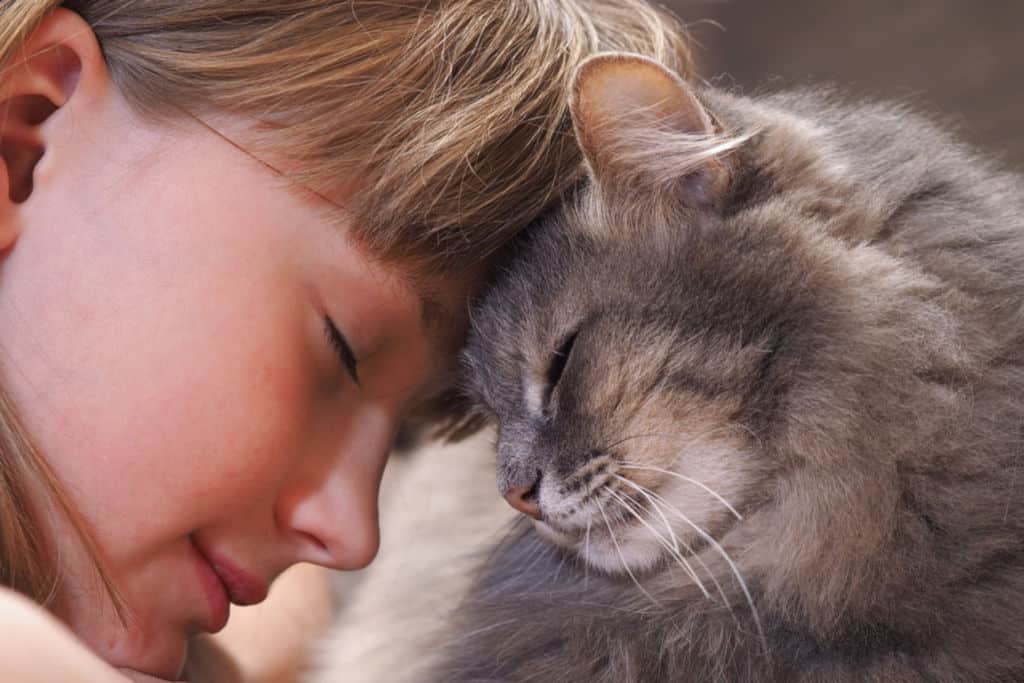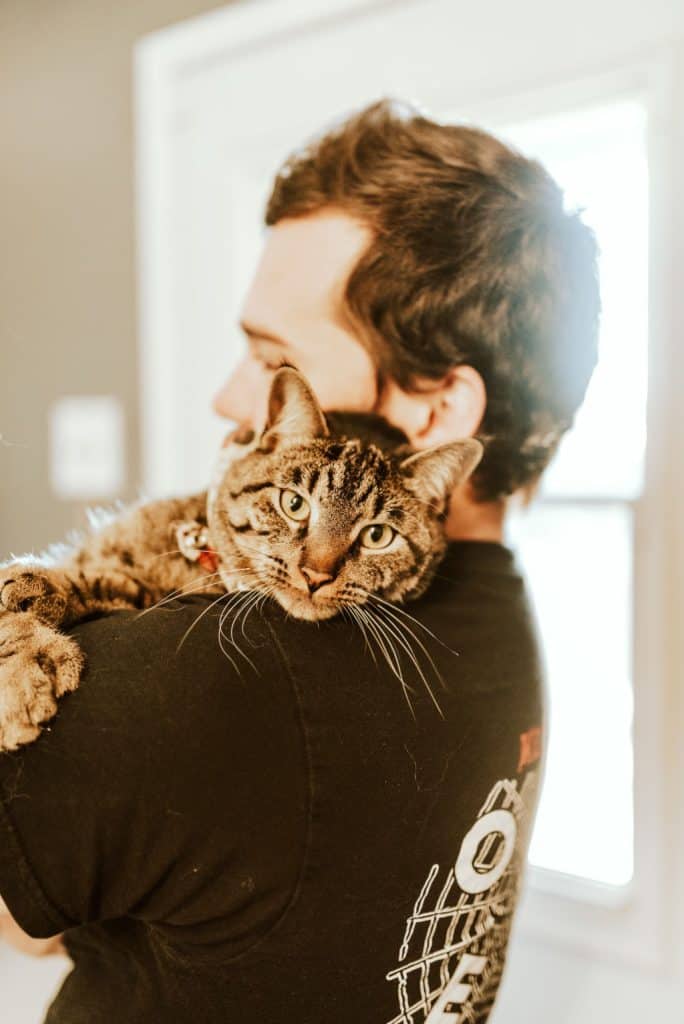Note: We may earn a commission from helpful, relevant links in our content. No cost to you. See our privacy policy.
People mostly kept cats to hunt small rodents, which is why cats will always be a little wary. It’s a smart behavior because they aren’t physically big either. Cats can also survive in the wild much easier than dogs, so they’re more independent.
However, not all dogs are friendly and loving, and not all cats are paranoid. If the dog is abused as a puppy, they will have trust issues. The same applies to a cat.

Why Is It Hard to Win a Cat’s Trust?
Cats, unlike dogs, have not been as domesticated and have retained much of their wild nature. Cats are still wild animals in many ways, with strong instincts. They are only one generation away from becoming wild once more.
While many cats are reserved by nature, building trust can be expedited by understanding their unique communication cues, like the flick of a tail or the direction of their whiskers.
They are a bit more solitary animals, which is one of the reasons they are more challenging to win. If they like you, they will choose you, but only if you devote quality time to them at their pace. Cats can be fickle and territorial, and it’s in their nature to be more reserved.
Sometimes when you rescue a cat, the new kitty hides. It’s usually not about you but about the territory.
For cats, territory is everything. Knowing your territory is synonymous with survival. So when a cat is moved to a new territory, it can be very upsetting for them, and it may take them some time to build up their trust in the people there.
Cats need 3-8 weeks to forget their old territory and claim the new one. It takes time for them to feel at ease in their immediate surroundings and routine. It’s not enough just to name your cats and think they’ll love you. You have to be patient, and work on the relationship.
For all these reasons, winning a cat’s trust is much harder. However, there are many ways to earn a cat’s trust.
How Do You Win a Cat’s Trust?
Feeding a cat regularly, preferably on a schedule, is one of the best ways to gain their trust. Make sure it’s wet food, as it’s the most appealing alternative to straight-up canned tuna or salmon.
Stay in the room while they eat if they don’t mind it. Otherwise, build up to it. For each meal, scoot the bowl closer and closer to you until you can hold it. Talk to them while they eat, so they get used to hearing your voice.
Interestingly, research has shown that cats often prefer their food and water sources to be separate. Moving their water bowl away from their food might encourage them to drink more, reflecting a more natural behavior
If it is a newly rescued cat, confine them to a calm and quiet room, away from small children and other pets. Provide one or more hiding spots, but they must be appropriate. Some examples include a cat house, a pet carrier, or even a cardboard box or modified storage container.
They will develop playful attitudes toward humans if you play with them as kittens. If that never happens, they can remain distant for the rest of their lives. Adult cats are slow to learn new behaviors, but each cat is unique.
Bonding time with toys like strings and feather toys is your best bet. One of their favorite toys is a wand with feathers at the end. If the kitty finally follows the toy with its eyes after three attempts, that is huge. Take it for what it is and build from there.
Did you know that cats have a ‘hunting rhythm’? Simulating a prey’s movement, like dragging a toy mouse in sudden, unpredictable motions, can make playtime feel more like a hunt, increasing engagement.
Using toys that mimic the movement of prey, such as automated laser toys or wind-up mice, can engage a cat’s natural hunting instinct and foster a sense of camaraderie when you play together.
Soft, gentle brushing can serve as a trust-building exercise, replicating the sensation of a mother cat grooming her kittens.
If the cat loses your trust, you must be patient to regain it. They’ll come around eventually. Continue to feed them, give them space, and allow them to approach you without initiating petting. It demonstrates respect for their freedom, and they will learn to trust you.

Give them some treats. Cats love Temptations treats, so when you give them one, repeat their name. Keep treats on hand and try to call them. If they do come, immediately provide them with the treat and affection to reinforce that being around you is a positive experience.
Another viable option is to purchase one of those pheromone products, such as Feliway. It’s a pheromone-based plug-in that gives cats a sense of security and may reduce stress.
It’s a delicate balancing act in their comfort zone. Don’t push them too hard, but it’s also important to challenge them regularly, little by little, to facilitate progress. Be patient, and learn to appreciate the small victories.
And remember to stay predictable in your actions. Cats are creatures of routine and habits, just like us. The more you do things at a specific time, the more they’ll feel at ease and know what to expect.
Why Is It Easy to Win a Dog’s Trust?
Dogs are simple to sway because they crave a pack and a pack leader, usually you. They are genetically programmed to be social and to belong to a group. Dogs have been bred for centuries to be our companions and to be trustful to humans.
Dogs are friendly because they have evolved into man’s best friend over time. Those who were more friendly and could read human emotions were bred more. Being our best friends and liking and trusting people is in their genetic makeup.
Another reason dogs form good friendships with humans is that dogs are easier to train, and training creates a strong bond between dogs and humans. Dog training is not a way to get your dog to behave a certain way. Think of it as a means to communicate with each other.
A large part of this stems from confidence. A dog can defend itself more easily than a cat, which will observe you from a distance and evaluate your behavior.
Cats will try to defend themselves as best they can, but they are smaller than dogs, and their instinct is to avoid confrontation, which is also wise. Dogs appear to prefer to face it. However, these generalizations will vary depending on the cat or dog.
FAQs
What’s the best way to bond with a cat?
The best way to bond with a cat is to give them some space, let them initiate bonding, provide wet food at a specific time, play with them regularly, and reward desirable behavior with treats and affection.
Are dogs more loyal than cats?
Dogs are more obvious in their behavior, but that doesn’t mean cats aren’t as loyal. Cats are more independent and usually bond with only one person, which may appear disloyal. It ultimately depends on the animal and its experience.
Is it easier to own a cat than a dog?
Cats are generally easier to care for because they require much less maintenance. Dogs require far more exercise and attention than cats. You can also leave a cat at home for a long weekend, but not a dog. Dogs also require more training and money to care for.
Alex, a passionate animal lover, has experience in training and understanding animal behavior. As a proud pet parent to two dogs and three cats, he founded AnimalReport.net to share insights from animal experts and expand his knowledge of the animal kingdom.









